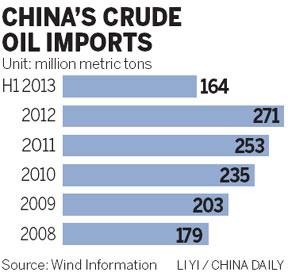PetroChina poised to dominate Iraqi oil
By DU JUAN (China Daily) Updated: 2013-08-13 23:53
However, Lukoil Chief Executive Vagit Alekperov has said the company prefers an Asian player to replace Norwegian oilcompany Statoil ASA, which sold its 18.75 percent stake last year. West Qurna-2 is expected to produce 500,000 bpd in 2014.
Gao Jian, an oil analyst at Sublime China Information, a Chinese commodity consultancy, said the possible deal will increase the domestic crude supply (in Iraq) for a short period, because oil companies usually sell their products on overseas markets instead of transporting them back home.
"In the long run, it will be beneficial for the company's assets and revenue," he said. "However, (PetroChina) has to solve the first problem, which is to reach the production target set by the Iraqi government, before it can be in total charge of the resource."
According to the General Administration of Customs, China's dependency on energy imports has consistently risen.
Crude oil imports expanded 1.4 percent year-on-year to 164 million metric tons in the first seven months of 2013. Gasoline imports increased 6.6 percent to 24.85 million tons.
In 2007, the company won exploration rights to Iraq's southern oilfield, Ahdeb, for $3 billion. The next year, it joined with BP Plc to gain exploration rights to Rumaila, the biggest oilfield of Iraq, for $15 billion.
PetroChina is also the operator of the Halfaya field.
Iraq's oil industry has made a remarkable recovery since international oil majors returned to the war-torn country in 2009.
Iraq overtook Iran in 2012 to become the second-largest oil producer in the Organization of Petroleum Exporting Countries.
- China 'incredibly innovative' in many areas: Apple CEO
- City official: Guangzhou further committed to opening-up
- Jack Ma: Globalization backed by technology will cut inequality
- HNA confirms interest in ASEAN's infrastructure investment
- Comments on Xi's letter to 2017 Fortune Global Forum
- China to create more opportunities for the world: Xi
- US tax cuts impact on China two-sided: economists
- Chinese enterprises job fair to be held in Sri Lanka

















